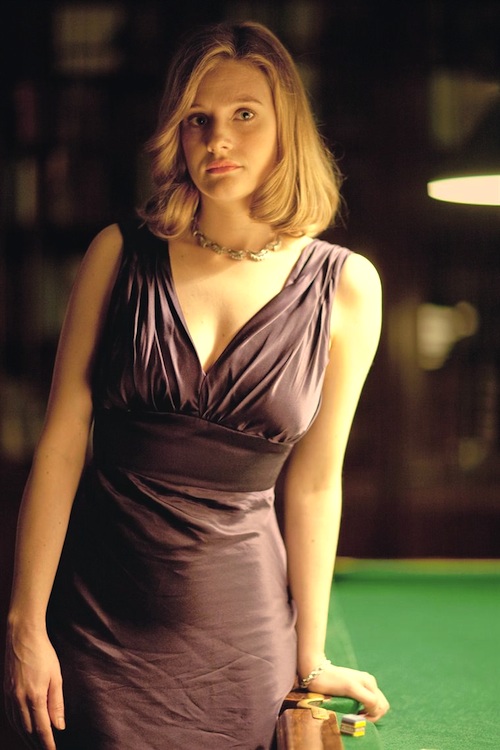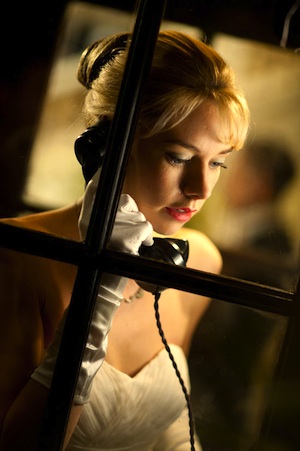By Joe Bendel. It is a provocative, ‘what if’ question. Had the United States forcefully backed the British government during the Suez Crisis, how would history be different? Indeed, the Soviet backed Nasser’s media victory is often considered a precipitating factor contributing to the overthrow of the pro-western Hashemite monarchy in Iraq, but everything turned out okay there in the long run, right? Instead America undercut her closest ally to curry favor with the UN and the independent Arab States. How well did that work, again? A watershed moment for the collective British psyche, the Suez Crisis supplies the backdrop for the newsroom drama The Hour, which premieres on BBC America this Wednesday as the inaugural selection of the network’s Dramaville showcase of British dramatic limited series, hosted by Luther’s Idris Elba.

Bel Rowley and longtime platonic friend Freddie Lyon consider themselves the future of British journalism, wasted in the BBC’s newsreel department. Unfortunately, Lyon is a bit too tightly wound for his own good. When the call comes to work on the network’s new weekly newsmagazine, The Hour, Rowley gets the producer job he covets. Nearly chucking away his career out of resentment, Lyon reluctantly accepts an unglamorous position as the home affairs correspondent. He might be brilliant, but his personal cold war with Hector Madden, the show’s presenter, complicates Rowley’s position. Much like William Hurt in Broadcast News, he is not gifted at thinking on his feet during an interview segment. However, the married Madden’s ambitions are considerable and they include Rowley.
Initially, the show-within-the-show flounders, but when the Suez ignites, they hit their stride. Suddenly questions of censorship are raised when the Eden government starts invoking the gag rule for issues under debate in parliament. To that end, Angus McCain, an Eden advisor with a rather vague portfolio, starts haunting the BBC offices, creeping out the staff with his oiliness. Shocking as it might sound, it turns out many of the journalists have their own agendas as well.
For most of the first three episodes, The Hour hints at a conspiracy within the Eden government, possibly involving the murder of Ruth Elms, Lyon’s childhood friend of aristocratic lineage. However, two events occur in episode four that cloud the show’s ideological implications, making it richer and more complex: the Soviets invade Hungary and we learn they also have a mole operating within the BBC. Just what sort of Cold War morality play The Hour will ultimately become is not at all certain at the shows mid-point, but that ambiguity is not necessarily a bad thing.
Many critics might be tempted to dub the show Mad Men meets Smiley’s People. Indeed, the show has a well crafted 1950’s period look and there is certainly a good deal of alcohol being consumed. The moody jazz-influence score also nicely heightens the noir atmosphere.

Though Ben Whishaw has a considerable following in the UK, he makes a rather weak protagonist as Lyon. While he is supposed to be somewhat nebbish, he literally looks like a boy among men. Conversely, Romola Garai is quite convincing as the driven but patronized Rowley, often coming across like a British Laura Linney (with whom she co-starred in Richard Eyre’s largely forgettable The Other Man). Perhaps the greatest star power comes from Dominic “The Wire” West’s Madden, exhibiting leading man presence, while also conveying a host of insecurities and failings, the likes of which are not entirely clear yet. In fact, it is a strong ensemble effort, with many small but memorable supporting turns. However, Anna Chancellor often upstages everyone as foreign correspondent Lix Storm. Part Martha Gellhorn and part Joan Crawford, she is all woman, but has more testosterone than any man on the show.
Though the first two installments were helmed by Coky Giedroyc, a highly regarded television director best known for literary fare like The Virgin Queen, The Hour is a bit slow out of the blocks. Frankly, part four ends at a point the show probably could have reached sometime the third episode. Still, she masterfully establishes the atmosphere of intrigue, laying the foundation for several appropriately intricate subplots.
Picking up steam as it goes along, by the close of episode four, The Hour really pulls viewers into its time and place, leaving them increasingly curious how the puzzle pieces will fit together. If the concluding two episodes live up to their promise, The Hour should definitely be worth viewers’ investment of time (and a little bit of patience). It premieres this Wednesday (8/17) on BBC America, before it even concludes across the Atlantic.
Posted on August 16th, 2011 at 10:50am.